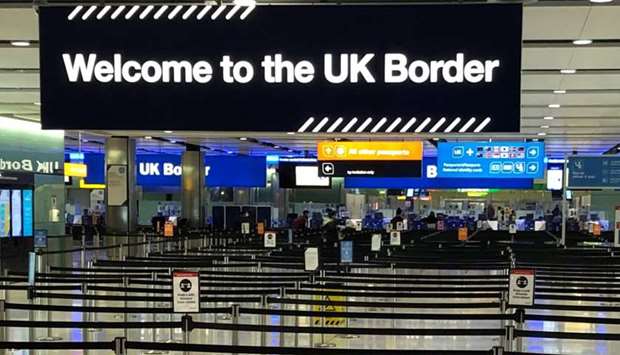Britain will require all inbound travellers to take a pre-departure coronavirus (Covid-19) test, and arrivals from Nigeria will have to quarantine in hotels to slow the spread of the Omicron variant, the health minister said yesterday.
Prime Minister Boris Johnson has said that travel restrictions are necessary to slow the spread of Omicron while scientists race to understand more about the coronavirus variant, its transmissibility and implications for vaccine effectiveness.
“We’ve kept the data under review over the last week or so since we learned about Omicron, and we’re seeing increasing number of cases linked to travel,” Sajid Javid said in a broadcast clip. “We’ve always said we will act swiftly if we need to, if the changing data requires that, and that’s why we decided to bring in this change on pre-departure tests.”
The pre-departure testing requirement will mean all inbound travellers must take a test a maximum of 48 hours before departure time, and will come in from 0400 GMT on Tuesday.
Nigeria will be added to Britain’s travel “red list” at 0400 GMT on Monday.
Javid said that the number of cases of Omicron in Britain had risen to around 160, and that Nigeria was second only to South Africa in terms of Omicron cases linked to travel.
South Africa and nine other Southern African countries were added to the red list last weekend, meaning that entry is only allowed to UK citizens or residents who then must quarantine in a hotel.
Yesterday Britain reported 42,848 new Covid-19 cases, government figures showed, a drop in daily cases following two straight days where more than 50,000 cases were recorded.
There were 127 deaths within 28 days of a positive coronavirus test, down from 143 deaths reported on Friday.
India meanwhile reported its third case of the Omicron coronavirus variant, government officials said yesterday, as total Covid-19 cases inched closer to the 35mn mark.
Officials in the western state of Gujarat said the patient who tested positive for Omicron was a 72-year old man of Indian origin who had lived in Zimbabwe for decades, and returned on November 28.
India reported 8,603 new Covid-19 cases yesterday, taking the total to 34.62mn.
Deaths rose by 415 to 470,530.
India expects the Omicron variant to cause less severe illness, due to rising vaccination rates and high prior exposure to the Delta variant that infected nearly 70% of the population by July.
The Omicron variant spread in Australia yesterday, testing plans to reopen the economy as a cluster in Sydney grew to 13 cases and an infection was suspected in the state of Queensland.
Federal authorities are sticking with a plan to reopen the economy on the hope that the new variant proves to be milder than previous strains, but some state and territory governments have moved to tighten their domestic border controls.
Australia reported its first community transmission of Omicron on Friday at a school in Sydney.
Authorities are investigating the source and said more cases were expected.
Queensland authorities suspected its first Omicron case in a person who travelled from South Africa and that genome sequencing was ongoing.
“The public health unit have ruled out that it is Delta but we haven’t been able to confirm if it is Omicron,” state Health Minister Yvette D’Ath. “But it is being treated as if it is.”
Authorities in South Australia said yesterday that arrivals from New South Wales, Victoria and the capital territory will be tested.
The state reopened its domestic borders only days ago for the first time in months.
Several thousand people protested vaccination mandates in Melbourne, with the demonstrations now a weekly event that has been attracting groups of regular citizens, as well as far-right and conspiracy theory supporters.
A smaller counter-protest called to stop the far-right movement in the city and support vaccinations.
Australia has had just under 215,000 cases in total and 2,042 deaths.
South Korea meanwhile reported a record daily 5,352 new Covid-19 infections and 70 deaths, while a nationwide total of nine cases of the Omicron variant have been confirmed, the Korea Disease Control and Prevention Agency (KDCA) said yesterday.
The hospitalisation rate was rising rapidly led by severe cases of Covid-19, with the number of serious and critical patients at 752 as of Friday, the KDCA said.
South Korea has also confirmed three additional Omicron cases, bringing the total to nine after a fully vaccinated couple tested positive for the coronavirus variant after travelling from Nigeria last week.

(Representative photo)
